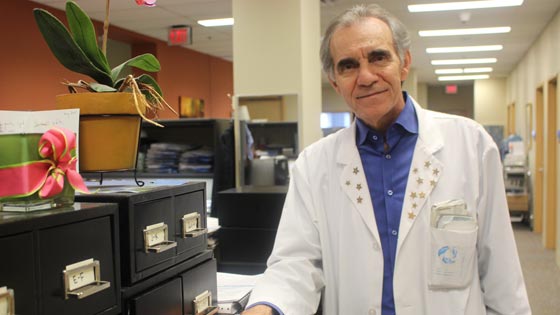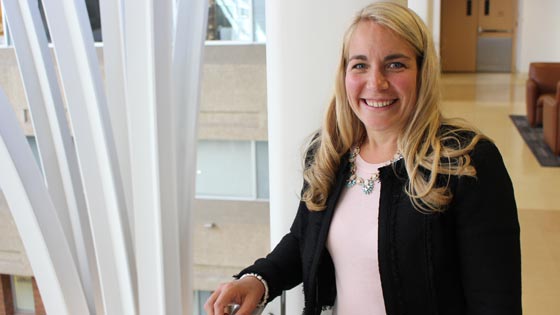
Krembil neurosurgeon Dr. Fred Gentili says adding the Crean Hotson Chair in Skull Base Surgery to his portfolio is an honour and a thrill. (Photo: UHN)
Nancy Hotson was excitedly preparing for the arrival of her second child when she felt a strange sensation creep across her face.
"I just felt these pins and needles," Nancy says motioning to the right side of her face. "I figured it had something to do with the pregnancy."
The uncomfortable tingling continued to be a nuisance, even after Nancy gave birth to a healthy baby girl named Melanie in 2011. Tests on her sinuses and hearing turned up nothing out of the ordinary. Then a neurologist suggested that a magnetic resonance imaging (MRI) scan could get to the bottom of the problem.
"I went to my follow-up appointment thinking this is nothing, it's just a formality," she says. "Instead, the neurologist said, 'We've found something in your head. It's a tumour and it's growing'."
Nancy's MRI uncovered a barbell-shaped tumour called a trigeminal schwannoma at the base of her skull.
"I had a four-month-old baby, and a two-year-old at home. It was terrifying. Rapidly growing tumours are never a good thing. I said 'Please put me in touch with the best neurosurgeon possible'."
Fortunately for Nancy, her next appointment was with Dr. Fred Gentili, a neurosurgeon at the Krembil Neuroscience Centre (KNC) who specializes in skull base surgery. This surgical approach is considered high risk, since it targets tumours located underneath the brain.
"This type of surgery is very difficult because it goes to the most difficult regions to reach in both the brain and skull," says Dr. Gentili. "The challenge is accessing a tumour while avoiding the critical blood vessels and all of the nerves that are packed in there."

Nancy Hotson was so grateful to Dr. Fred Gentili for removing a tumour that she decided to give back to UHN. (Photo: UHN)
Over the last 30 years, Dr. Gentili has pioneered a host of complex treatments for tumours located in difficult to access places. His endonasal surgical approach has garnered worldwide attention and led hundreds of medical students and other surgeons to pursue training at KNC.
"The first time I met Dr. Gentili he said, 'There's no need to worry, everything will be fine'. He is so calm," says Nancy. "At the time I almost wanted him to be more concerned, but now I know it's because he's so capable."
Despite Dr. Gentili's assurances, Nancy began to prepare for the worst. She put together a parenting wish list for her husband, which was designed to help him care for their children should something go wrong.
"I was planning for the worst-case scenario. I had two children and needed to consider, practically, how are they going to be cared for."
On Oct. 27, 2011, five months after her diagnosis, Nancy underwent craniotomy surgery at KNC under the direction of Dr. Gentili. The 12-hour surgery was a success and Nancy was released from hospital less than a week later, just in time for Halloween.
"I was so excited because trick-or-treating was starting," she says. Son Bradley dressed as a monkey while daughter Melanie went as a ladybug. "I was able to get to two houses before my family came out and brought me back inside. But it was the first step and it felt great."
While the bandages came off a few weeks later, some of the emotional and psychological effects lingered. It was during this period that Nancy decided she needed to give back to UHN and Dr. Gentili.
"He's so unbelievably skilled as a surgeon, his determination and expertise allowed him to remove the entire tumour, even though it was a difficult shape. Because of this, my risk of tumour regrowth is negligible, which is the best outcome a patient can have.
"Dr. Gentili gave me the gift of living a healthy tumour-free life."
In addition to offering her support to patients who have gone through similar circumstances, Nancy is now involved in the Toronto General & Western Hospital Foundation's Brain Campaign as well as UHN's annual Discovery Ball, which raises funds for the Krembil Research Institute.
But her most significant contribution is already helping Dr. Gentili cement his legacy as a giant in the field of micro-neurosurgery.
A tribute to Dr. Fred Gentili. (Video: TGWH Foundation)
Nancy and husband Brad convinced her parents Wendy and John Crean to generously contribute two-thirds of the funding required to establish the Crean Hotson Chair in Skull Base Surgery at UHN.
The academic chair – for which Dr. Gentili is the first recipient – is the first of its kind in Canada and includes a $3-million endowment.
"We have some of the best neurosurgeons in the world right here in Toronto at the Krembil Neuroscience Centre," says Nancy. "We want to send a message about the need to recognize and nurture excellence in the field."
Dr. Gentili is equal parts thrilled and honoured to accept the chair after dedicating more than three decades of his life to devising innovative surgical techniques that are used in operating rooms around the globe.
"The importance of the chair is that it provides an outlet for leadership and guidance into skull-base surgery," he says. "It's a multifaceted approach. It allows for clinical research, it supports fellowships, and it supports anatomical studies that will help us find new techniques and approaches that make treatment less risky for the patient."
In addition to allowing him to continue to push boundaries in the field of micro-neurosurgery, the chair provides an opportunity for Dr. Gentili, 69, to recruit, train and begin to consider succession planning for the skull-base surgery program at KNC.
"To have my work recognized by the community, my patients and peers in this way is an incredible honour," says Dr. Gentili.
"But it's not about me. The establishment of this chair should make all of UHN proud."
